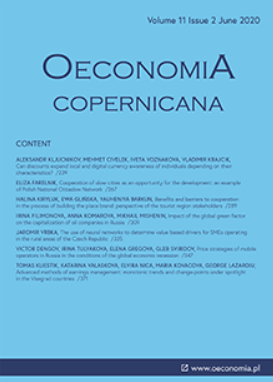Tax evasion in the EU countries following a predictive analysis and a forecast model for Slovakia
Tax evasion in the EU countries following a predictive analysis and a forecast model for Slovakia
Author(s): Ján Dobrovič, Rastislav Rajnoha, Petr ŠuleřSubject(s): Economic policy, Comparative politics, Economic development, EU-Accession / EU-DEvelopment, Fiscal Politics / Budgeting
Published by: Instytut Badań Gospodarczych
Keywords: sustainable economic development; tax evasion; VAT gap; predictive statistical model; forecasting;
Summary/Abstract: Research background: Tax evasion is an urgent challenge for governments, as reaching sufficient level of tax revenues enable adequate sustainable economic development. The motivation for the research was thus the identification of the situation in the EU countries. Purpose of the article: The main research objective was to identify the extent of tax evasion in the EU countries, with a subsequent specific focus on the econometric predictive models and a forecast of their future development in the case of Slovakia as the poorest performing country of the V4 in this area. Methods: The research was primarily based on testing selected statistical indicators in the field of tax evasions expressed on the basis of the VAT gap. The data for the research was obtained from the EUROSTAT database and the international system VIES for the period between 2000 and 2017. In addition to panel graphs, the research hypotheses were tested primarily using a cluster analysis, t-test, time series analysis, and an analysis of the time series trend with 4 basic models: linear trend, quadratic trend, growth curve model, and S-curve model. On the basis of the Mean Absolute Percentage Error (MAPE), the S-Curve model was selected as the determining model of predicting tax evasion. Findings & value added: Based on the results of the cluster analysis, the EU countries were divided into five reference groups by the VAT gap value, using the VAT gap percentage share on the overall GDP value. The research also provides a unique methodological framework and a unique econometric model for predicting the future VAT gap in Slovakia as the poorest performing country of the V4 in this area, which is applicable to other V4 and EU countries. The research results also enable policy-makers in the EU countries and specifically also in Slovakia and other V4 countries to compare themselves explicitly with the reference countries of the EU in terms of tax evasion and subsequently adopt adequate measures to improve the effectiveness and performance in this field.
Journal: Oeconomia Copernicana
- Issue Year: 12/2021
- Issue No: 3
- Page Range: 701-728
- Page Count: 28
- Language: English

